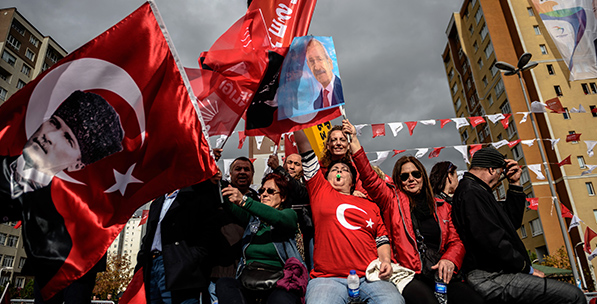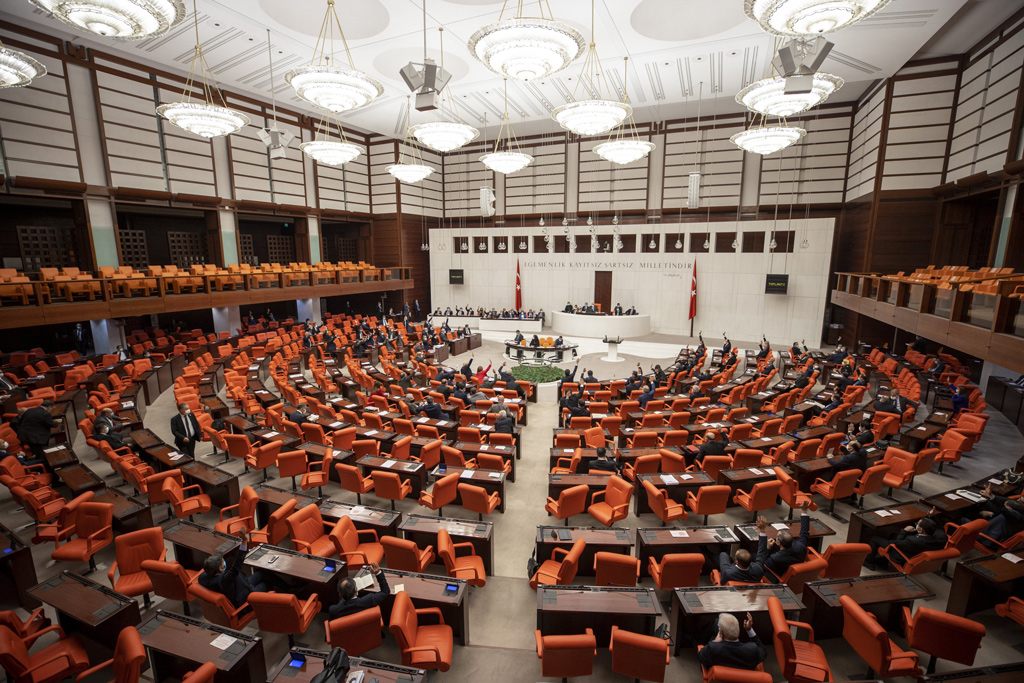Last week I tried to debate the discrepancies of the Kemalist modernization paradigm that represented Turkey's status quo for 80 years. There are two fundamental reasons for this. First, although the Kemalist modernization paradigm is not in power today, it remains of central importance to the opposition's socio-political vision. The second reason is that those who identified themselves as anti-Kemalist pre-2000, but who continue their political opposition today outside the bounds of power, have adopted Kemalist modernization discourse as a referential framework. Today I would like to deepen the debate by considering three main sources feeding Kemalist modernization understanding in Turkey.
In the most general sense, we can put forward that the Kemalist modernization understanding taken up by the civilian and military bureaucracy and pro-Western elite is fed from the three main sources of the Comte-Durkheim tradition that found a response in the Turkey of the 1930s, the modernization theory of 1950s America and the leftist conservatism of 1960s Turkey.
The clearest tone within the Kemalist modernization paradigm is the one assembled from French social thought, the societal vision represented by Auguste Comte and Emile Durkheim, which has formed the main vein of hegemonic modernization and societal understanding in Turkish political culture. Within this context, the following approaches by Durkheim have been especially influential. One, regarding society as being made up of its harmonious parts, which regards differences in a society as problematic and defends that the main ideal of society is unity, two, regarding laicity not as a political tool but as an ethical frame, three, saying that the main purpose of national education is not to raise acceptable citizens rather than individuals and four, there are different employment groups instead of different classes in society.
CONCEPT OF MODERNIZATION AND DISCOURSE OF DEVELOPMENT
The 1950s can be described as the period in which contemporary Turkish political culture's hegemonic modernization paradigm began to acquire new content. The justifications for this are given by some as the transfer to multi-party politics while others explain it through the Democrat Party's arrival to power. However, the actual matter is that Turkish foreign policy entered an American orbit after the United States took over world hegemony in the aftermath of World War II in 1945. Societal change theory formulated in U.S. universities from the 1950s and given the name modernization theory in connection with the position America gained in global politics found wide reception in Turkey.
Modernization theory is a political/societal engineering project that claims to carry non-Western societies from the "traditional level" to a "modern level." Modernization theory was put forward with the contributions of prominent social scientists of the period and with great public support. It developed explanatory models for modern social life, the function of social institutions and the social transformation period for different societies. The societal change model put forward by modernization theorists affected both Turkey's concept of the social sciences and also its political culture.
The following are the fundamental principles offered by the modernization model in modernization theory:
1) The formative subject of modernization is the West. The U.S. is the leader of the West and, in Talcott Parsons's opinion, the "leading society," and for this reason, should be the model for the modernization of non-Western societies.
2) There are three types of societies in the world: Modern, traditional and transitional. A modern society is one in which urbanization, industrialization, communication, high literacy rates, secular political systems, democratic ideals and universal human rights exist. Traditional society is one in which these do not exist. These societies that were caught up in the current of modernization and whose traditional aspects were loosening were experiencing a kind of limbo.
3) The modernization of non-Western societies depends first and foremost on the elimination of internal weaknesses caused by tradition. In other words, non-Western societies reaching the objective of modernization depend on their ability to systematically manage periods of internal liquidation and external intervention.
4) According to this approach, modernization must be regarded as a revolutionary, universal, unavoidable, irrevocable and homogenizing period, and a reality, in the words of Samuel P. Huntington. This new approach, represented by American modernization theory, added on to the modernization paradigm of Turkey's republican period and has contributed to the shaping of the hegemonic modernization perspective of contemporary Turkish political culture.
Modernization theory has not radically changed Turkish political culture and the hegemonic modernization interpretation within it rather modified and strengthened it in accordance with the needs of the bureaucratic oligarchy. Reading this situation correctly depends on keeping the eclectic quality of Turkish Westernization in mind. Within contemporary Turkish thought, life and political culture, the relationship, entered into with the cultural unit imagined as "the West" has always been an eclectic one. Who would be translated, transmitted and even taken as the hegemonic reference was shaped depending on a preference, and this preference was shaped by the hegemonic body and classes. In this sense, be it the Comte-Durkheim tradition from the French school of thought that was chosen or while modernization theory was being introduced as the main frame of reference, this eclectic approach came into play. A thought was not transmitted to the environment of thought or politics just because it was the trend of the time. For this reason, the Comte-Durkheim tradition was merged with the suggestions and predictions of modernization theory and together shaped the hegemonic modernization paradigm found in Turkish political culture.
LEFTIST CONSERVATISM
While analyzing social space, Norbert Elias states that the greatest mistake that can be made is the reduction of the processes to conditions. Many conditions we accept as absolute are actually processes within which undercurrents flow. When considering the adventure of the perception of hegemonic modernization in Turkish political culture from this point, we must take into account that new factors were added over time. The leftist-Kemalist approach that became a prominent political position in the second half of the 1960s enlarged the hegemonic modernization paradigm represented by the bureaucratic elite in the political culture through "developmentalist" rhetoric dependent on an Occidentalist imagination of the West. The economism and nationalism that sprouted from this rhetoric grew enough to encapsulate both the Turkish left and right after 1980.
The Kemalist modernization paradigm influencing Turkey's managerial mind until the 2000s slowly lost its efficacy and, in contrast with this, a perspective of modernization with stronger ties to society and more hybrid forms that offers the establishment of more rational relations with cultural regions outside its own began to come to the fore.
Contradictorily, one of the critiques directed at this perspective of modernization, which forms the main vein of the Justice and Development Party (AK Party) administration, has been that it has begun to become more Kemalist. The reason for this criticism, coming especially from Gülenists and pro-Kurdish rights figures, is due to the AK Party beginning to actively cultivate the theme of unity from the Kemalist modernization paradigm in the past three years. However, the AK Party management's emphasis on unity does not ignore the differences in society, but rather the coexistence of citizens with different identities. The recognition of Kurds in the political arena has only been made possible by the new vision of societal unity built by the AK Party in the neo-Kemalist period.
The opposition, in contrast, has been attempting to not allow the AK Party to develop its own political approach or understanding of modernization after 2000 and has attempted to pre-empt it from transforming its difference into politics. For this reason, it regards the AK Party not as a contender to be struggled against, but rather an enemy to be destroyed.
[Daily Sabah, December 25, 2015]







